We all know how the logistics and supply chain industry operates at a rapid pace. However, the evolving expectations of customers continuously reshape business requirements, making it difficult to keep pace. Accordingly, businesses must deal with intricate networks of suppliers, transportation, warehouse systems, and last-mile deliveries while meeting customer expectations. So, in order to tackle these challenges, conversational AI has become a key solution for businesses.
Certainly, the concept of conversational AI is designed to streamline logistics and supply chain management with tools like chatbots, voice assistants, and virtual-agents. In addition, it automates tasks, improves communication, and enhances decision-making. Besides, today when businesses are highly looking for speed and efficiency, adopting AI is not optional but a necessity.
Therefore, let’s explore how conversational AI can streamline logistics and supply chain management.
Here we go…!
What is Conversational AI?
So, coming to the base here – What is Conversational AI? Well, it is a suite of technological components that allow computers to understand, process, and respond to human languages. Likewise, by using Natural Language Processing (NLP), machine learning algorithms, and speech recognition – It allows machines to have meaningful conversations with human users.
Examples:
These tools come in various forms, like:
- Chatbots: Automated programs that engage in text-based conversations to assist users with routine tasks such as order tracking or answering (FAQs). In essence, check-out the key takeaways from our recently conducted webinar on – (Transforming customer experience with AI strategies.)

- Voice Assistants: Devices like Amazon Alexa, Google Assistant, or proprietary enterprise tools use voice recognition to execute commands or provide real-time updates.
- Virtual Agents: Truly, virtual agents are more advanced than traditional chatbots, capable of managing complex interactions and drawing from various data sources.
Moreover, in enterprise settings, conversational AI is increasingly being adopted in logistics and supply chain operations. Consequently, it is transforming customer service, internal communications, and operational workflows.
Key Challenges in Logistics and Supply Chain Management
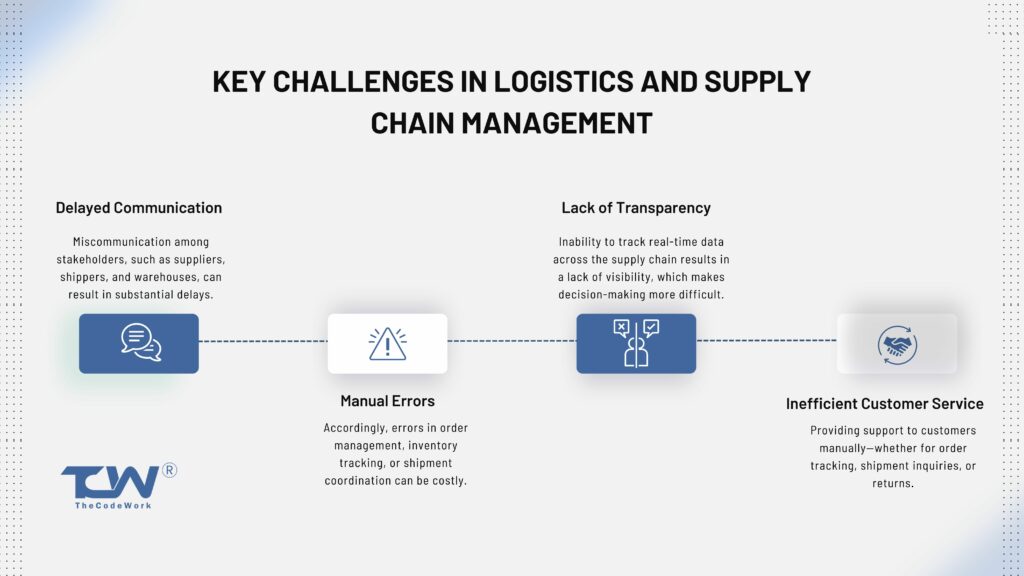
Now, despite technological advancements, logistics and supply chain management continue to encounter various challenges hindering efficiency and increasing costs. For instance, some of the most frequent bottlenecks include:
- Delayed Communication: Miscommunication among stakeholders, such as suppliers, shippers, and warehouses, can result in substantial delays.
- Manual Errors: Human-driven processes are prone to mistakes, especially in large-scale operations. Accordingly, errors in order management, inventory tracking, or shipment coordination can be costly.
- Lack of Transparency: Inability to track real-time data across the supply chain results in a lack of visibility, which makes decision-making more difficult.
- Inefficient Customer Service: Providing support to customers manually—whether for order tracking, shipment inquiries, or returns. At times, it can be resource-intensive, especially during peak times.
Moreover, logistics managers frequently need to manage communication across various platforms and channels, which can complicate coordination efforts. Now, to overcome such complexities and enhance operational efficiency; Its worth exploring how TheCodeWork’s logistics solutions offer a more integrated approach.
How Conversational AI addresses these challenges?
So, coming to the most interesting part of the blog! Lets dive into how such interactive AI tools are positioned to address severe challenges in logistics and supply chain management.
Let’s go…!
Automating Customer Service

One of the biggest challenges in logistics is managing customer inquiries efficiently. Likewise, AI-powered chatbots, can automate routine customer service tasks, such as:
- Order Tracking: Customers can use a chatbot for real-time shipment updates, eliminating the need to wait for a human agent.
- Shipment Inquiries: Plus, AI-powered systems can handle questions about delivery times, shipping rates, and more.
- Returns Processing: Also, virtual agents can guide customers through return procedures, minimizing human intervention.
Consequently, by offering immediate and accurate responses with AI-driven tools – Businesses are reducing wait times and improving the overall customer experience to a great extent.
Improving Internal Communication
As we know, in logistics, clear and timely internal communication is crucial for smooth operations. Now, this is where Koo Bot, developed by TheCodeWork, significantly enhances this aspect by streamlining communication channels within teams. It immediately finds out information that you have been searching or need from CRM platforms streamlining the workflow.
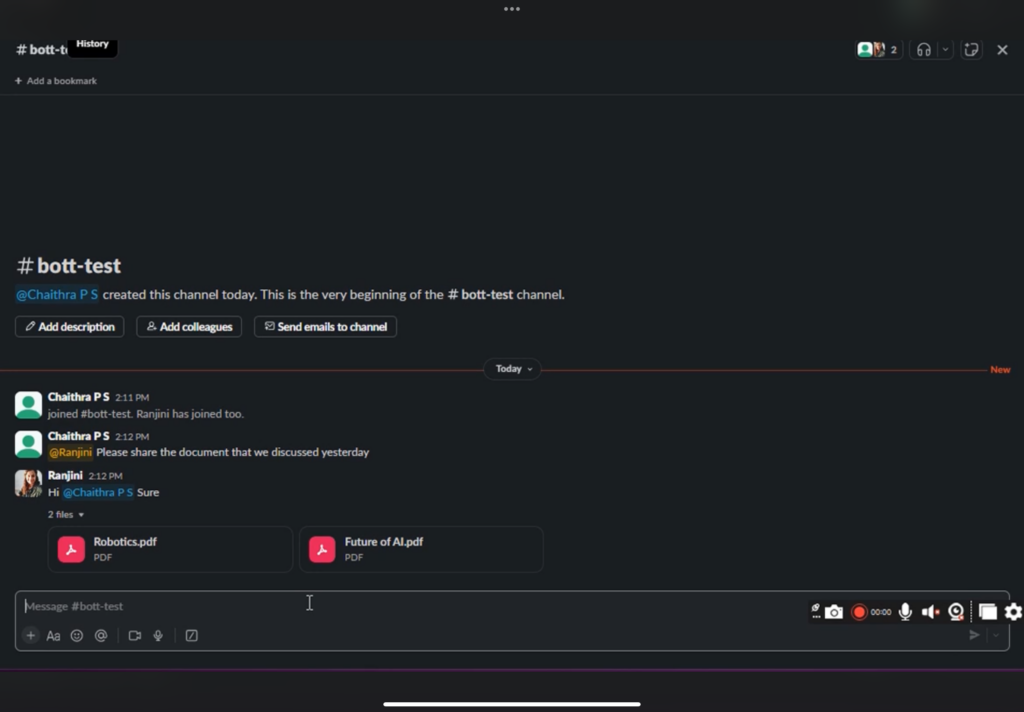
Also, Koo Bot answers document queries and provides precise summaries, saving time and boosting efficiency. Plus, its customisable across platforms – Book a free Demo
Furthermore, AI-powered chat systems allow teams to communicate more effectively by:
- Automating Notifications: AI can send automatic reminders or notifications to team members regarding delivery schedules, inventory levels, or supply chain disruptions.
- Centralized Communication: Additionally, AI-based systems can unify communications across teams of drivers, warehouse workers, and dispatchers. As a result, it ensures that everyone stays updated on real-time developments.
Therefore, by minimizing manual work and optimizing communication channels – Conversational AI prevents miscommunication and facilitates smooth coordination between departments.
Streamlining Order Management

Interactive AI technologies can integrate seamlessly with enterprise systems like ERP (Enterprise Resource Planning) and WMS (Warehouse Management Systems) – In order to automate critical order management functions, like:
- Order Processing: AI agents can take over repetitive tasks such as processing incoming orders, tracking fulfillment, and notifying customers when orders are shipped.
- Reducing Manual Errors: Plus, it can send real-time prompts or alerts when it detects anomalies in the ordering processes. Accordingly, it ensures that issues are resolved before they escalate.
Furthermore, seamlessly integrating AI with fleet management softwares can greatly expedite order processing, making logistics operations more efficient.
Therefore, to know more on it- Check out our blog on fleet management softwares.
Enhancing Freight and Delivery Coordination

Delivery coordination often involves multiple parties, from suppliers to drivers and customers. So, here’s how interactive AI tools enhance this process by:
- Real-Time Tracking: Voice assistants and AI-powered chatbots can offer real-time tracking information to dispatchers and drivers, ensuring that everyone stays informed.
- Instant Updates: Automated chatbots can send instant notifications regarding route changes, delivery status, and potential delays, allowing for better contingency planning.
In doing so, AI helps logistics teams reduce downtime and avoid costly delays.
Benefits of Conversational AI in Logistics and Supply Chain
Subsequently, it delivers a range of benefits that improve both efficiency and customer satisfaction. So, let’s explore the most important ones:
- 24/7 Availability
One of the key advantages of AI-driven tools is that they can operate 24/7, unlike human employees. Likewise, this ensures that both customers and internal teams can access the information and support whenever needed.
- Scalability
During peak seasons like holidays—Conversational AI can scale effortlessly to handle increased customer inquiries and operational demands. Moreover, AI systems do not require additional staffing, allowing businesses to serve more customers without sacrificing quality.
- Cost Efficiency
Undoubtedly, human labor is one of the largest cost factors in logistics operations. However, an interactive AI tool reduces this expense by automating routine tasks and minimizing the need for human agents. Also, AI-driven solutions reduce the risk of human errors, leading to lower operational costs overall.
- Data-Driven Decision Making
Accordingly, AI captures valuable data from every interaction, providing logistics managers with insights into customer behavior, trends, and operational bottlenecks. Consequently, this data can be further utilized to optimize processes, improve resource allocation, and make more informed decisions.
- Improved Customer Satisfaction
Undoubtedly, faster response times and more transparent communication results in happier customer engagement. So, by automating routine inquiries and offering real-time updates, AI ensures that customers remain informed and satisfied throughout the process.
Use Cases of Conversational AI
Many global companies have already embraced it to enhance their logistics and supply chain operations. So, here are some notable examples:
DHL: Enhancing Customer Interactions with AI Chatbots
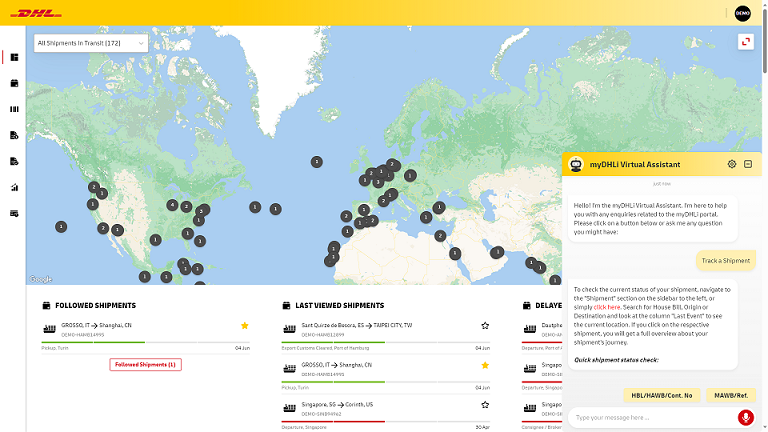
DHL, a global leader in logistics, has embraced Conversational AI to improve customer service and streamline operations. Likewise, they use AI-driven chatbots to handle a wide range of customer inquiries, including:
- Shipment Tracking: Customers can easily check the status of their shipments through DHL’s chatbot, which provides real-time updates and delivery estimates.
- Delivery Times and Dates: Accordingly, the chatbots can answer questions about estimated delivery times, helping customers plan accordingly.
- Returns and Complaints: Also, the AI system guides customers through the returns process and addresses complaints, reducing the need for human intervention.
Hence, by automating various interactions, DHL has been able to offer round-the-clock support, and reduce their response times.
FedEx: Real-Time Package Tracking with Voice Assistants
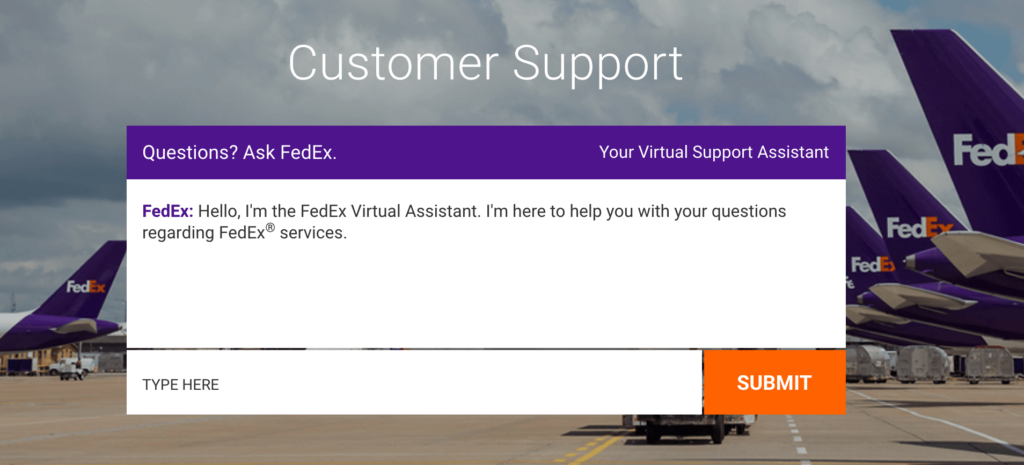
FedEx has integrated AI into its operations to enhance package tracking and coordination. Moreover, the company utilizes voice assistants to provide:
- Real-Time Updates: Voice assistants offer immediate updates on package locations, delivery statuses, and estimated arrival times.
- Automated Notifications: Plus, FedEx’s AI system sends automated notifications to customers and internal teams about shipment progress and potential delays.
- Driver Support: Also, AI tools assist drivers by providing route information, traffic updates, and delivery instructions through voice commands.
Undoubtedly, this implementation has improved the efficiency of package tracking and delivery processes. In addition, it ensures that both customers and FedEx employees stay informed and aligned.
Amazon: Streamlining Order Management with AI Chatbots
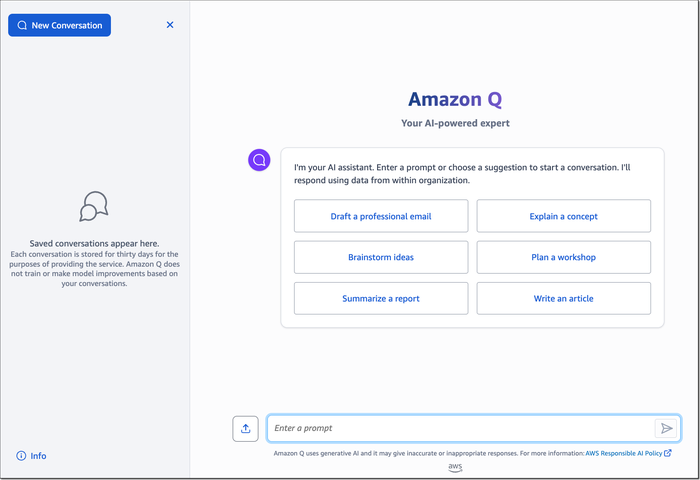
Amazon has highly leveraged interactive AI tools to streamline its extensive order management processes. Meanwhile, the company’s AI chatbots are employed to:
- Handle Order Inquiries: Chatbots manage questions related to order status, shipping details, and delivery schedules, providing customers with instant answers.
- Facilitate Returns: Additionally, AI tools guide customers through the return process, including generating return labels and processing refunds.
- Provide Personalized Recommendations: Also, Amazon’s AI chatbots offer personalized product recommendations based on customer preferences and past interactions.
As a result, integrating AI chatbots into its customer service operations has enhanced the efficiency of Amazon’s order management system.
Maersk: Optimizing Shipping Logistics with AI-Powered Virtual Agents
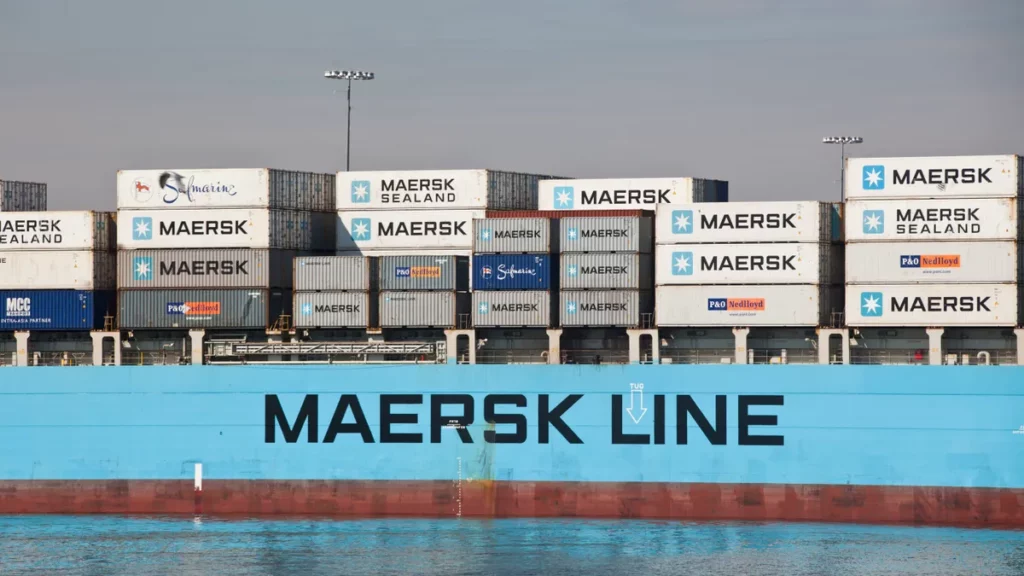
Maersk, a global shipping and container logistics company, uses AI to optimize its shipping logistics. Subsequently, the company employs AI-powered virtual agents to:
- Coordinate Shipments: Virtual agents assist in coordinating shipments by providing real-time updates and managing scheduling.
- Resolve Issues: Moreover, AI systems handle routine issues like booking confirmations, cargo tracking, and documentation, reducing human intervention.
- Enhance Communication: Also, Maersk’s AI tools streamline communication between shipping partners, suppliers, and customers, ensuring that all stakeholders are kept up-to-date.
Consequently, this has allowed Maersk to improve the accuracy and efficiency of its shipping operations. Moreover, it has resulted in better service and reduced operational costs.
Walmart: Improving Inventory Management with AI Chatbots

Walmart has implemented interactive AI tools to enhance its inventory management processes. Likewise, the company uses AI chatbots to:
- Monitor Inventory Levels: Chatbots track inventory levels and alert management when stock levels are low or when reordering is necessary.
- Assist with Restocking: AI tools help automate the restocking process by generating orders based on inventory data and sales forecasts.
- Provide Real-Time Updates: Walmart’s AI chatbots offer real-time updates on inventory status and order fulfillment, ensuring that store shelves are consistently stocked.
Hence, by automating inventory management, Walmart has reduced the risk of stockouts and overstocking. Due to which, it led them to have more efficient supply chain operations.
Future Trends
Undoubtedly, the future of Conversational AI in logistics and supply chain management is bright, with several emerging trends and possibilities. As technology continues to advance, interactive AI tools are set to play an increasingly pivotal role in shaping industries.
Therefore, let’s have a look at some key trends and possibilities on the horizon:
Predictive Analytics Integration
Predictive analytics involves using historical data and machine learning algorithms to forecast future events. When combined with Conversational AI, predictive analytics can provide logistics companies with advanced tools for anticipating and addressing potential disruptions. Future trends in this area include:
- Forecasting Demand and Supply
- Risk Management
As a result, logistics companies can make more informed decisions, reduce risks, and optimize their operations.
AI and IoT Integration
Integrating AI with Internet of Things (IoT) devices can provide even greater visibility and control over supply chain processes. For example, sensors on cargo containers can provide real-time data, which AI systems can analyze to offer insights into factors like:
- Potential Risks,
- Temperature Fluctuations
- Unexpected Delays
Decision-Making Support
Conversational AI could evolve into a tool for logistics managers, providing decision-making support based on real-time data and historical trends. As a result, it helps with route planning, inventory management, and resource allocation.
Eventually, the future of Conversational AI in logistics and supply chain management is filled with exciting possibilities. From integrating predictive analytics and IoT technology to enhancing decision-making and customer engagement. So, for businesses looking to stay ahead of the curve, must be ready to embrace these trends and scale further.

Moreover, to know how advanced technologies like these help you in driving success in the evolving logistics landscape – Feel free to have a chat with us anytime.
Implementing Conversational AI in Your Logistics Operation
Notably, implementing it in logistics operations requires careful planning and execution. Thus, here are some key steps to consider:
Assess Your Needs and Objectives
Before deploying your interactive AI, it’s essential to understand your operational requirements and objectives. So, consider the following:
- Identify Key Areas for Improvement: Determine which aspects of your logistics operations could benefit from AI, such as customer service, order management, or internal communication.
- Define Clear Objectives: Most importantly, establish what you aim to achieve with it, like reducing response times, improving accuracy, or increasing operational efficiency.
In turn, conducting a thorough assessment will help you choose the right AI tools and develop a tailored strategy.
Choose the Right Conversational AI Tools
There are various types of Interactive AI tools available, each with different capabilities. Hence, select the tools that best align with your objectives:
- Chatbots: Ideal for automating customer interactions, handling inquiries, and providing real-time updates.
- Voice Assistants: Useful for real-time communication, voice-based commands, and hands-free operations.
- Virtual Agents: Advanced AI systems that can handle complex queries and integrate with multiple data sources.
Furthermore, evaluate different tools based on their features, scalability, and compatibility with your existing systems.
Integrate AI with Existing Systems
Successful implementation requires seamless integration of interactive AI tools with your current infrastructure, for instance:
- ERP and WMS Integration: Ensure that the AI tools can interface with your (ERP) and (WMS) to automate order processing and inventory management.
- Communication Platforms: Also, integrate AI with your communication platforms to streamline interactions between teams and enhance internal collaboration.
Accordingly, effective integration will ensure that AI tools enhance your existing systems rather than complicate them.
Train Your AI Models
Now, to maximize the effectiveness of your AI tool; Its crucial to train the AI models to understand and respond to your specific operational context:
- Customize AI Models: Likewise, tailor the AI’s language models to understand industry-specific terminology and operational nuances.
- Feed Relevant Data: Also, provide the AI with historical data, frequently asked questions, and common scenarios to improve its accuracy and relevance.
Moreover, continuous training and updating of AI models will ensure that the system remains effective and responsive to evolving needs.
How can we help you?
Now, businesses lacking resources or expertise can partner with companies like TheCodeWork, resulting in getting the necessary support for implementing AI tools. Consequently, this partnership will provide the necessary assistance to effectively integrate and utilize AI technologies, like:
- Consultation and Strategy: AI development companies like us offer consultation services to help you define your requirements, like – Selecting the right tools, developing a customized implementation strategy
- Custom Solutions: Experts can create tailored AI solutions that address your specific needs and integrate seamlessly with your existing systems.
- Ongoing Support: Plus, partnering with AI experts ensures access to ongoing support and maintenance. As a result, it keeps your AI systems running smoothly with regular updates.
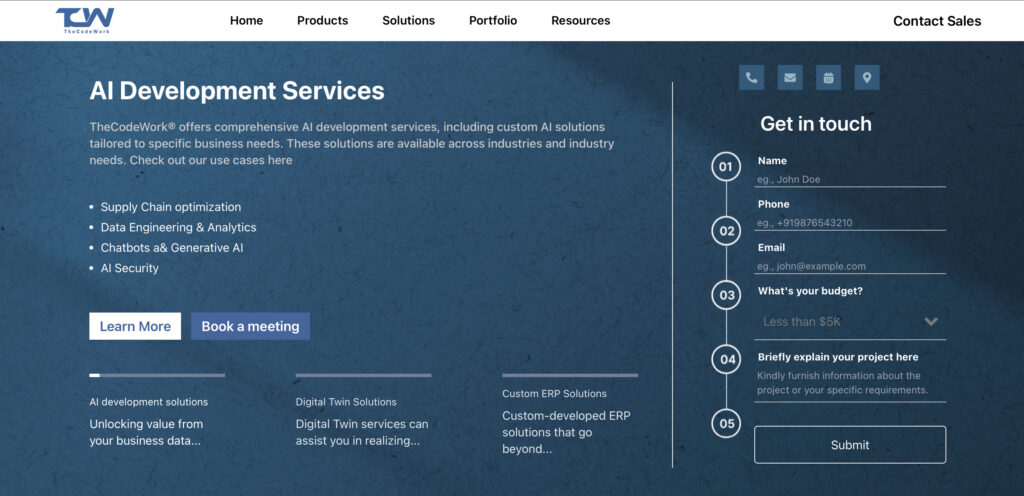
Undoubtedly, partnering up with an AI development company (especially, like TheCodeWork) – Provides you the expertise needed to implement and optimize custom AI solutions for your logistics operation.
Bottom Line
Summing Up, implementing Conversational AI in logistics offers numerous benefits, from automating routine tasks to enhancing communication and decision-making. Likewise, chatbots, virtual agents, and voice assistants automate various tasks and offer data-driven insights to optimize logistics. Hence, by carefully assessing your needs, choosing the right tools, integrating with existing systems – Businesses can successfully harness the power of AI to streamline their operations and achieve their goals.
Moreover, contact TheCodeWork to discover how our solutions can transform your logistics and supply chain operations.



